ECOSYSTEM DAMAGE CONTROL
Efforts to replace plastic water sachets in running races gather pace
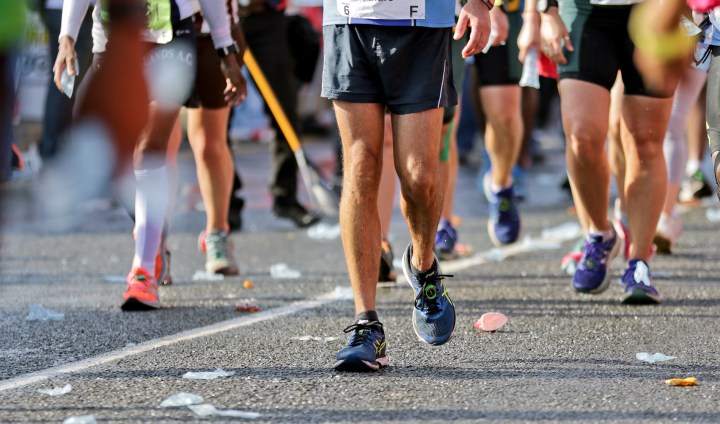
Convenience versus sustainability – it’s a conundrum that’s hotly debated in many aspects of our lives. The running community is no exception – water sachets are the most convenient and preferred hydration method for runners, but they leave an environmental footprint that extends far beyond the finish line.
If you follow in the wake of any road running race, you are likely to come across thousands of empty plastic sachets littering the ground.
These water sachets are runners’ and race organisers’ preferred and most convenient form of hydration, as athletes needn’t carry a water bottle or even stop running to drink.
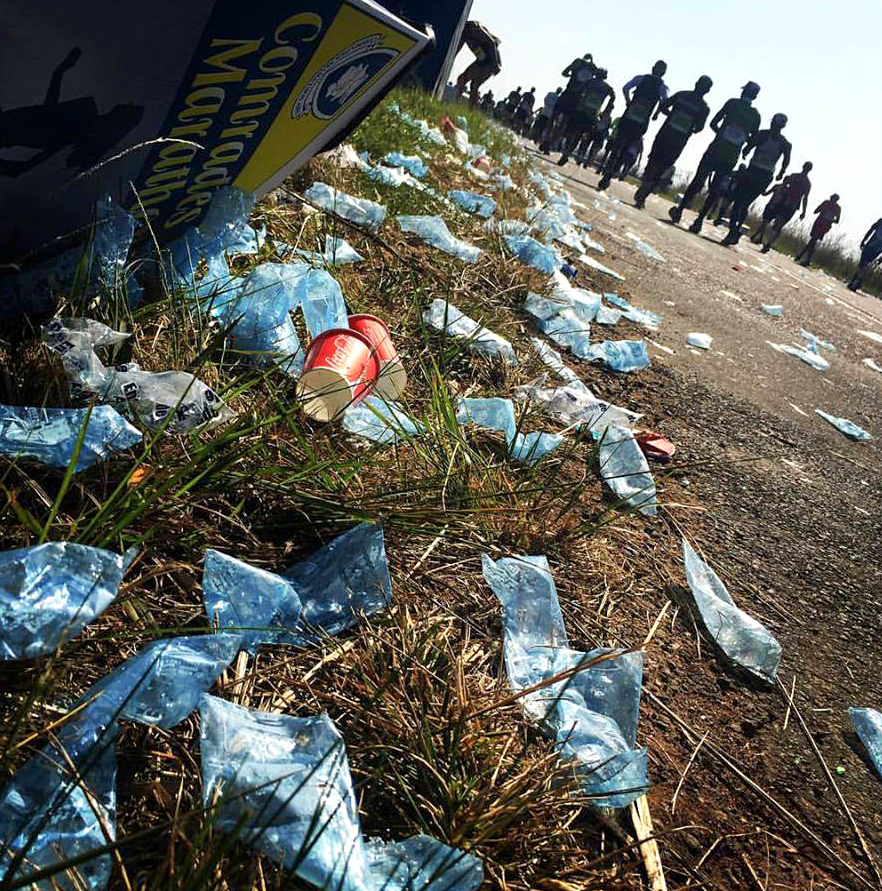
Plastic water sachets at the Comrades Marathon. (Photo: Supplied)
As Ann Ashworth, a previous Comrades winner, said: “On the road, time is critical. Any time that you stop moving forward in a road race is a waste of time.”
The problem is, like any event that attracts large crowds of people, it has a huge environmental impact.
Even though race organisers generally ensure the empty sachets are collected after a race, Lorren de Kock, senior manager for the circular economy portfolio at WWF SA, says: “There are lots of reports that the small pieces of plastic that runners bite off from the sachets are hard to pick up and often blow into the natural environment.”
Karoline Hanks has been running for more than 25 years. “I used to be a road runner and enter road races. Then I came to understand how massive the waste footprint was.” She stopped entering races that used plastic sachets.
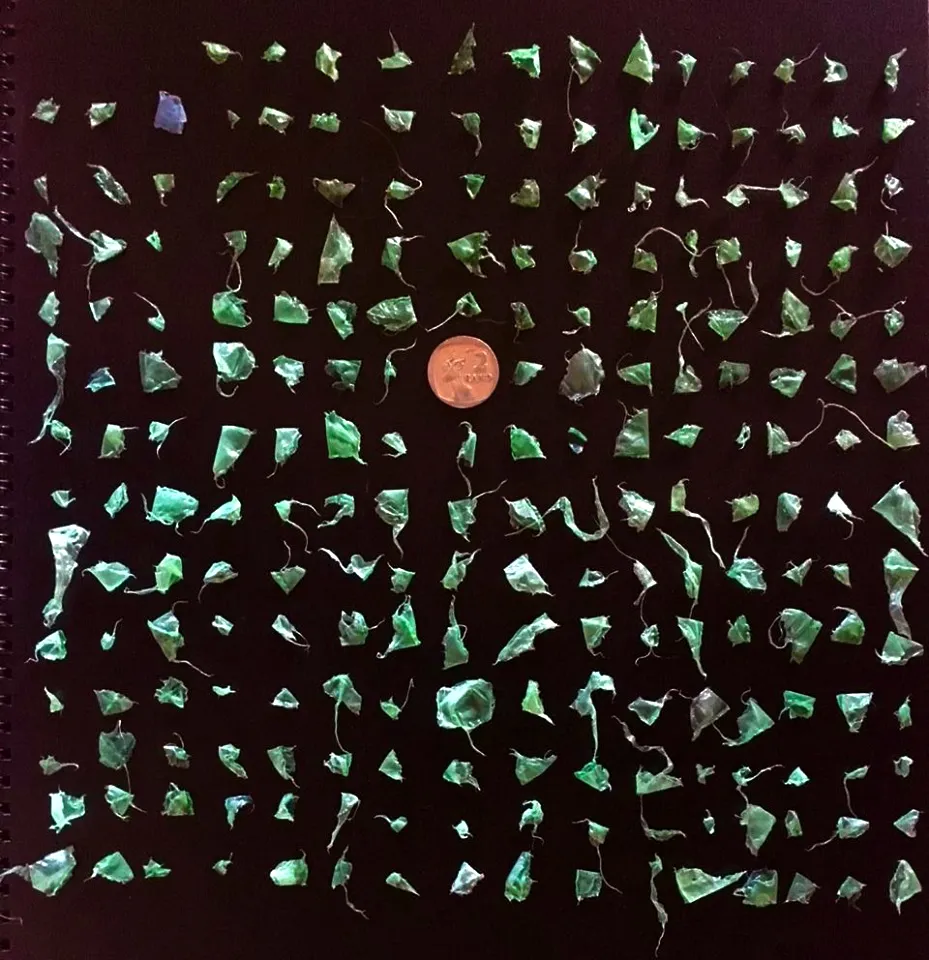
The many small bits of plastic that are bitten off when athletes use the water sachets at running events, that were missed by post-race clean-up. (Photo: Karoline Hanks)
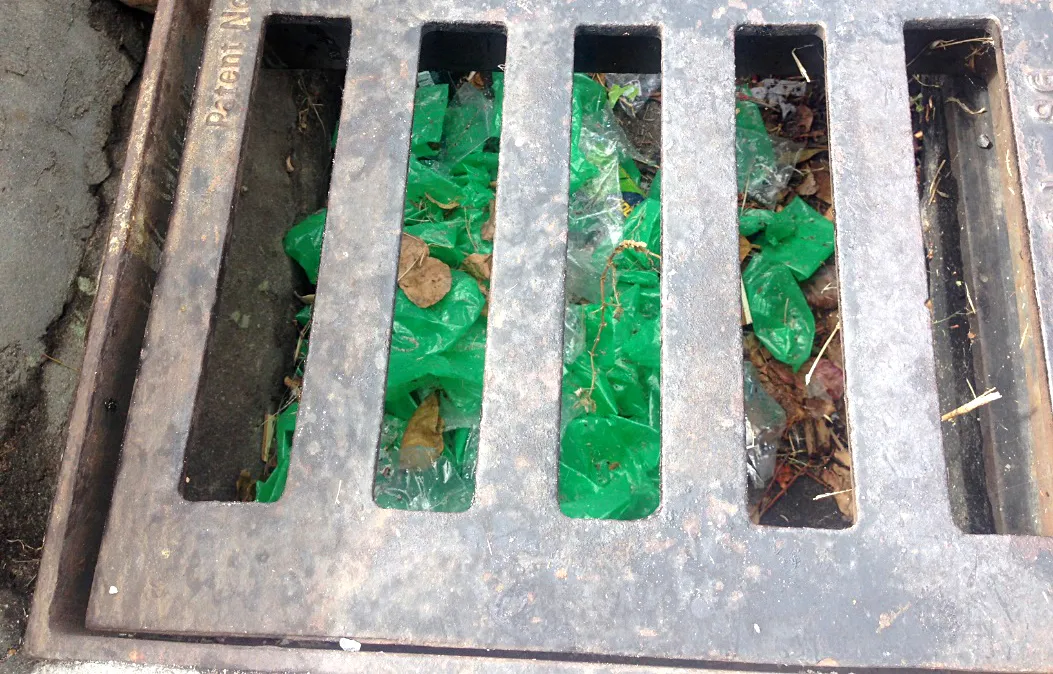
Plastic water sachets from a running event that ended up in a drain. (Photo: Supplied)
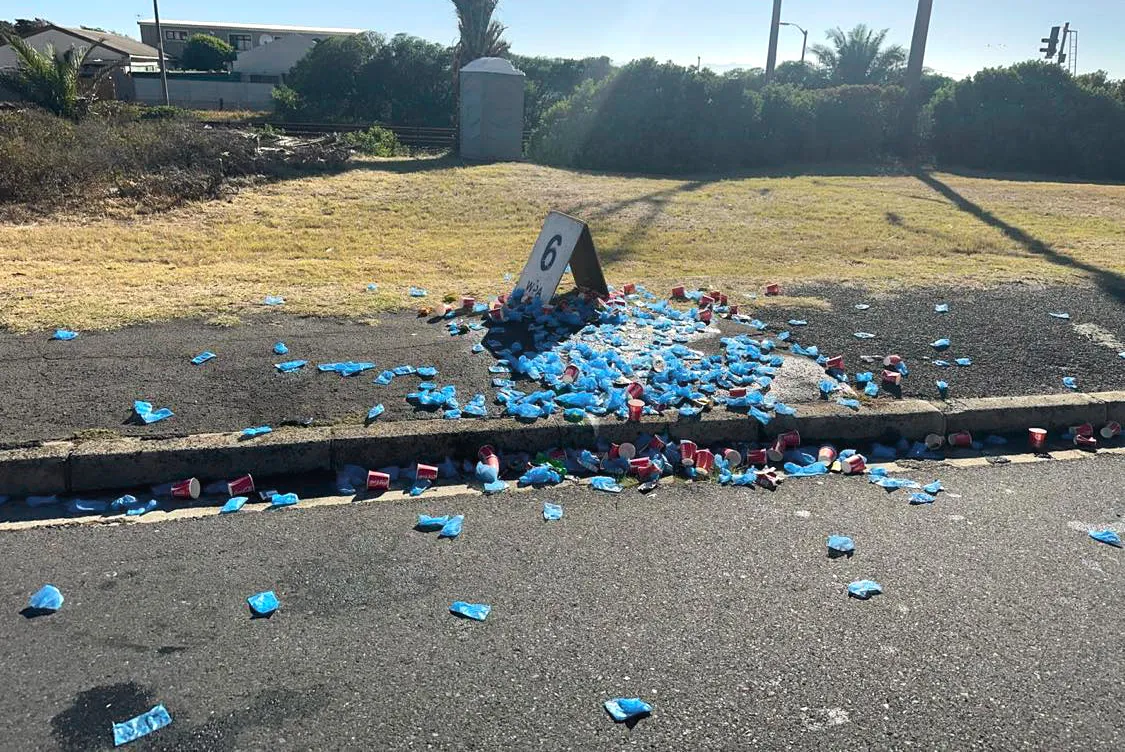
Plastic pollution after the Peninsula Marathon, 2024. (Photo: Steve Matthews)
Hanks told Daily Maverick that after the Two Oceans Marathon in Cape Town, she collected more than 300 corners from plastic sachets in just 100m on top of Chapman’s Peak Drive that had been missed by organisers.
“I also came to understand how the majority of road runners and race organisers simply seem oblivious to the impact they are having on the environment they run through, or how what they do impacts on a range of habitats and creatures ‘downstream’.”
Hanks was one of the founders of the #icarrymyown campaign which started a decade ago and advocates for runners to carry their own refillable containers (lightweight collapsible reusable cups, reusable bottles, hydration packs and so on) and for race organisers to provide the infrastructure for athletes to refill their containers.
“My only hope is that more runners become conscious, mindful and care enough to vote with their feet,” she said.
The problem with plastic
According to WWF SA, a little more than 2.5 million tonnes of plastic are produced annually in SA, and the latest figures indicate that only 20 to 30% of this is recycled.
Read more in Daily Maverick: Here’s how to dramatically decrease plastic pollution in three practical steps
De Kock said the reason for this low figure is that plastic packaging or product design often renders it unrecyclable; the format is too small to be collected; the product post-use has no value for collection, and there is no offtake for the recycled plastic.
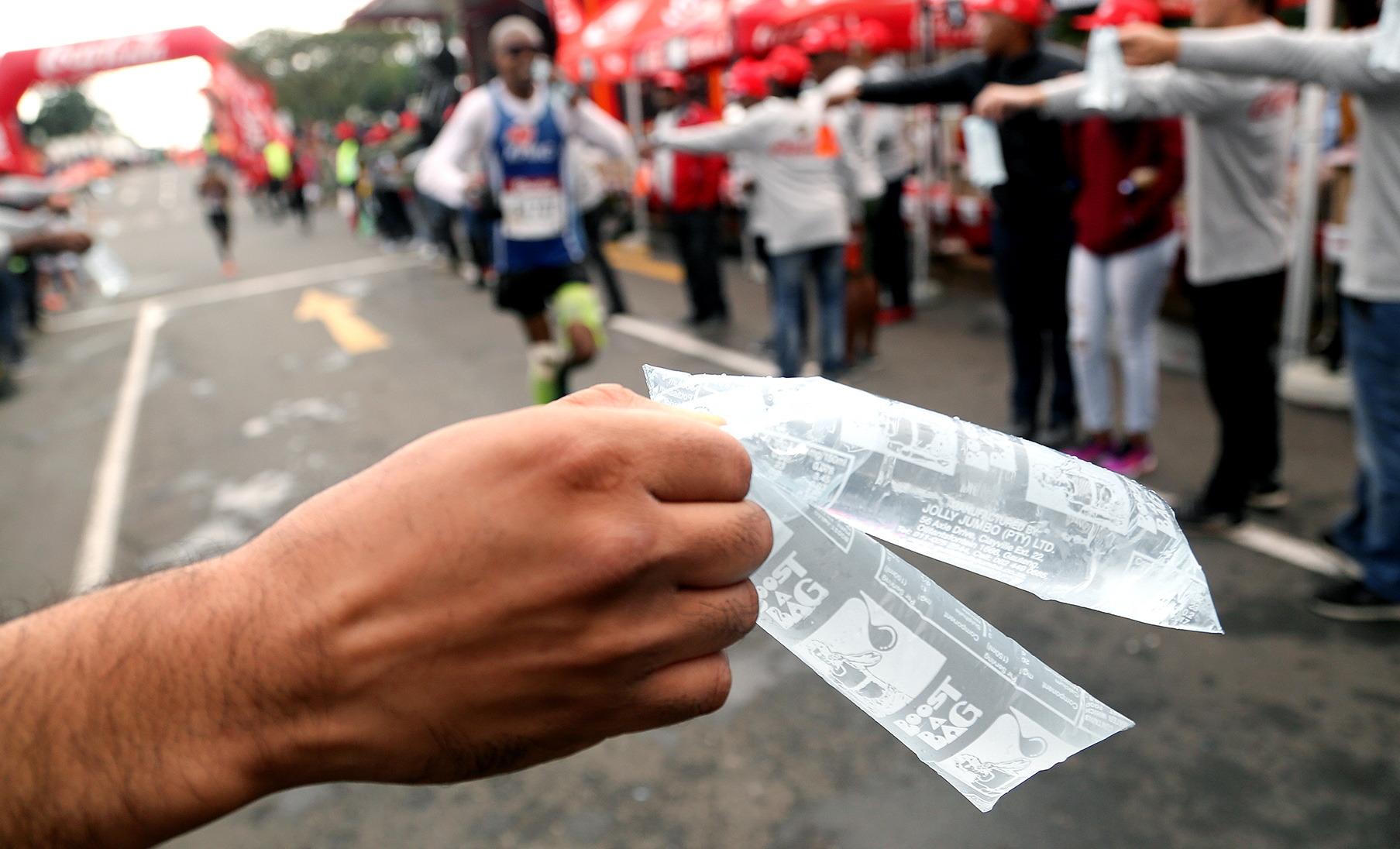
A campaign to stop plastic water sachets at road running events began over environmental concerns. (Photo: Howard Cleland / Gallo Images)
This means that the 70-80% of plastic that is not recycled (488 kt per annum) pollutes the environment. It contributes to air pollution through open burning (275 kt), land pollution (145 kt), or aquatic (freshwater and marine) pollution (68 kt), according to a recent study by the CSIR.
Paper cups
Hanks said that while a system based on refilling containers is unlikely at this stage, part of the transition their campaign recommends is for race organisers to provide unlined paper cups.
Paper cups are a better alternative to sachets or bottles, environmentally speaking, but only if they are not lined with plastic.
De Kock said paper cups usually have a plastic inner lining to prevent the liquid from being absorbed into the paper fibre.
The problem is that these cups are not recycled in SA. Because current technology cannot separate the plastic from the paper, they end up in landfills or the natural environment.
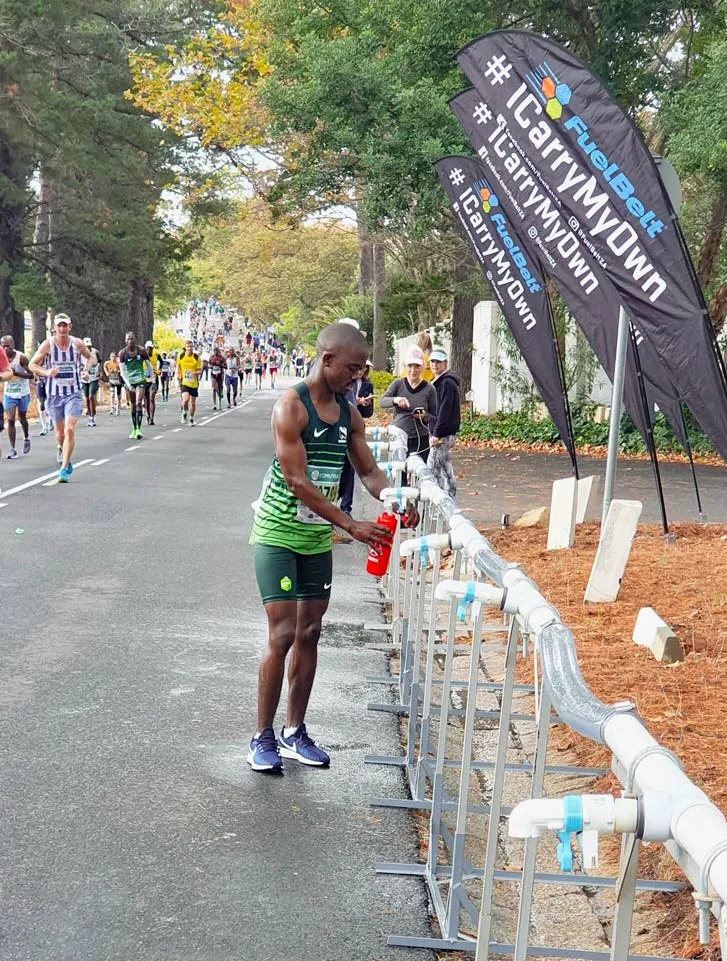
An example of a plastic-free hydration solution trialled in 2018 at the Two Oceans marathon. (Photo: Supplied)
“Overall, reusable bottles or containers have the best environmental performance, according to several studies globally and locally,” said De Kock.
“This is for all materials, from plastic to paper. The reusable containers would need to be used a few times, though, to demonstrate a better result. Single-use as an application of any material is a problem.”
Izette Mostert, who has helped organise two sachet-free races in the Western Cape, said they try to use only paper cups that don’t have plastic lining.
“It’s very tricky. Lined cups are a pointless exercise, but with paper cups, you have to time the pouring, because if the organisers pour too early, the cup collapses.”
The other problem with cups is that fast runners don’t like them.
Running against the clock
“From personal experience at the Two Oceans Marathon, where they banned the use of water sachets, I was able to get one mouthful of water for the whole 56km because I was running too fast to be able to get the water from the bottom of my cup into my mouth,” said one retired ultramarathon runner.
Athletes like professional long-distance road runner Nkosikhona Mhlakwana and cross-country and road runner Cian Oldknow agree that drinking from cups isn’t viable when you’re racing as a pro.
However, professional runners generally have teams who support them during the race, passing them reusable bottles from which to hydrate.
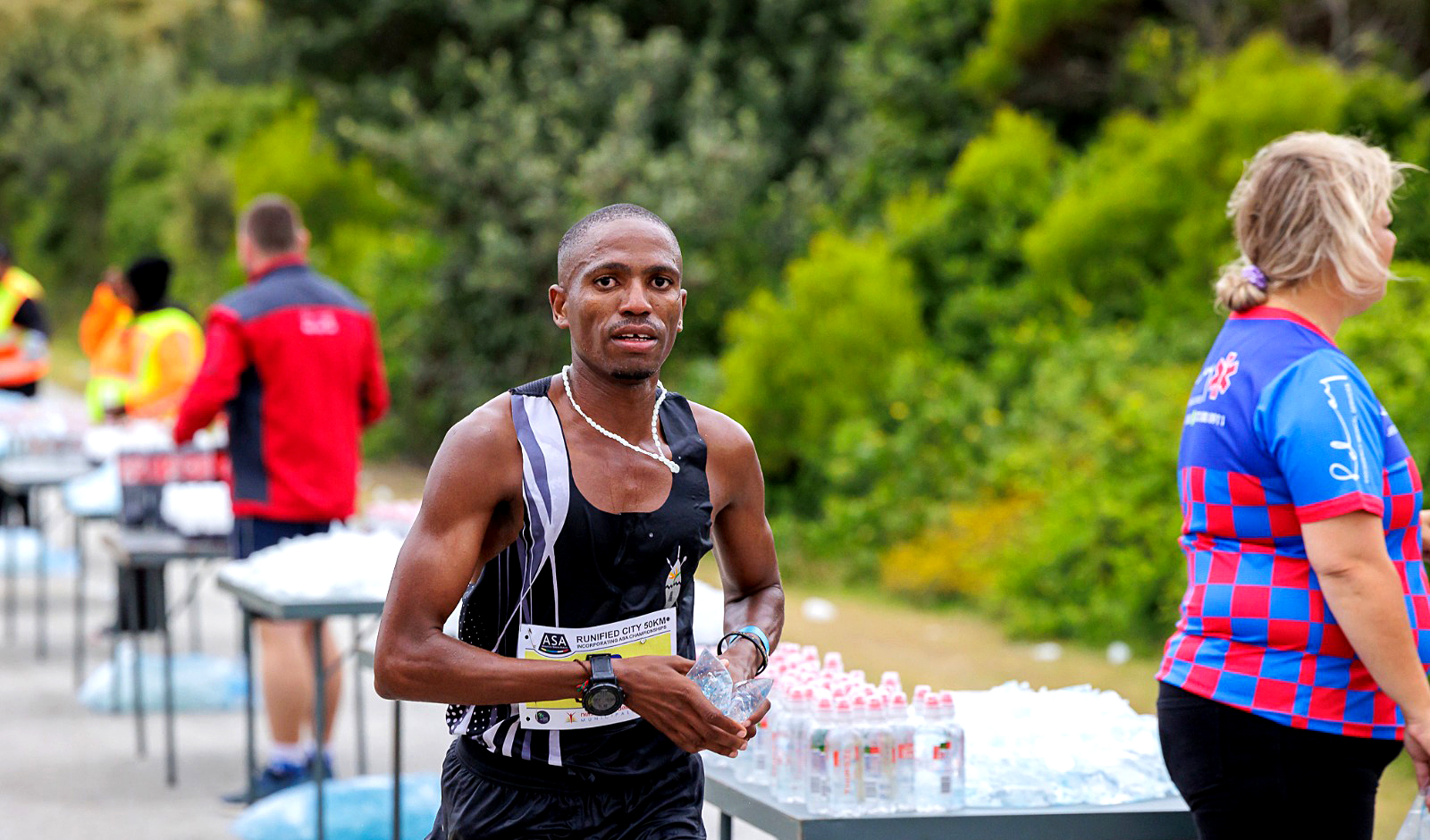
Nkosikhona Mhlakwana, professional long-distance runner, during the Runnified City 50km race, where he placed third, Gqeberha, 25 February 2024. (Credit: Eastern Cape Province Athletics)
Mhlakwana, who won gold at the Comrades and Two Oceans Marathon, told Daily Maverick that when he’s finished, his team makes sure to collect the bottles he has used during a race. He felt paper cups would be an ideal solution for most runners.
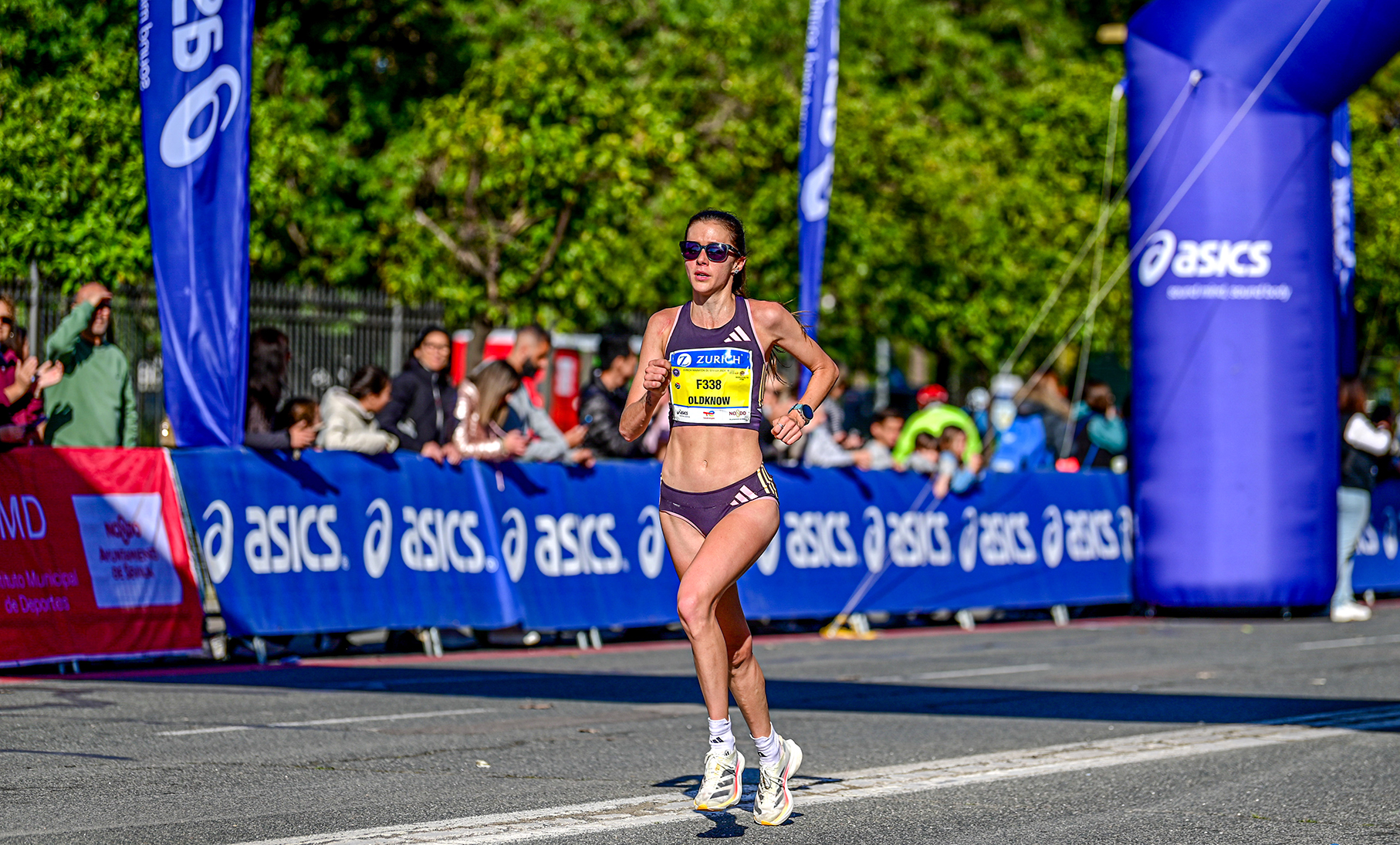
SA female pro road runner Cian Oldknow at the 2024 Zurich Seville Marathon in Spain, where she finished with the second-fastest SA women’s marathon time of 2:25:08 on 18 February 2024. (Photo: Zurich Seville Marathon)
Oldknow saw a similar system when she entered the Zurich Seville Marathon in Spain in February. There, runners in the elite field had tables separate from the general runners where they could grab the reusable bottles they had prepared.
Oldknow’s team would then pick up the bottles in her wake.
Mostert said that while she understood why front runners wanted the water sachets, not using them hadn’t affected her race times.
“After my first Comrades, I transitioned to running with a pack and I’ve run my best times and various distances with a hydration pack, not having to stop and compete for a sachet.”
The first step
Some races like the Two Oceans Marathon, Cape Town Marathon and the Gun Run have successfully transitioned from the use of single-use plastic water sachets to providing paper cups and encouraging runners to bring their own bottles to fill along the route.
JP Smith, Cape Town Mayco member for safety and security, told Daily Maverick that part of the event permit process, overseen by the city, included a waste management plan which required organisers to collect waste during their events and appropriately dispose of it.
“With that being said, the city has been engaging with Western Province Athletics about a consideration for all road races to transition away from single-use plastic water sachets and adopt environmentally friendly alternatives,” said Smith.
“Once these discussions are finalised, this would be made a condition for all permits issued by the events permit office.”
Read more in Daily Maverick: South Africa’s plastic pollution strategy is subpar, says new report
The Comrades Marathon – the world’s largest and oldest ultramarathon race held in KwaZulu-Natal – has, like most road races in SA, historically provided water sachets to the runners.
This year, 2.6 million plastic sachets will be provided by Thirsti for the 23,000 runners at 47 refreshment stations.
“And that’s just for the runners on the tables. There are also runners carrying their own bottles. So we are dealing with a massive plastic footprint at the race,” acknowledged Ann Ashworth, who is in her first year as Comrades Marathon race and operations manager.
This marks the first year that organisers will provide water tanks at five hydration stations along the 88km route for runners to replenish their own containers. Collapsible cups will also be available.
Ashworth told Daily Maverick that in the past, collecting large volumes of plastic for recycling purposes had been a challenge, so this year they are hoping to work with a recycling partner to collect the post-race debris which will then be recycled.
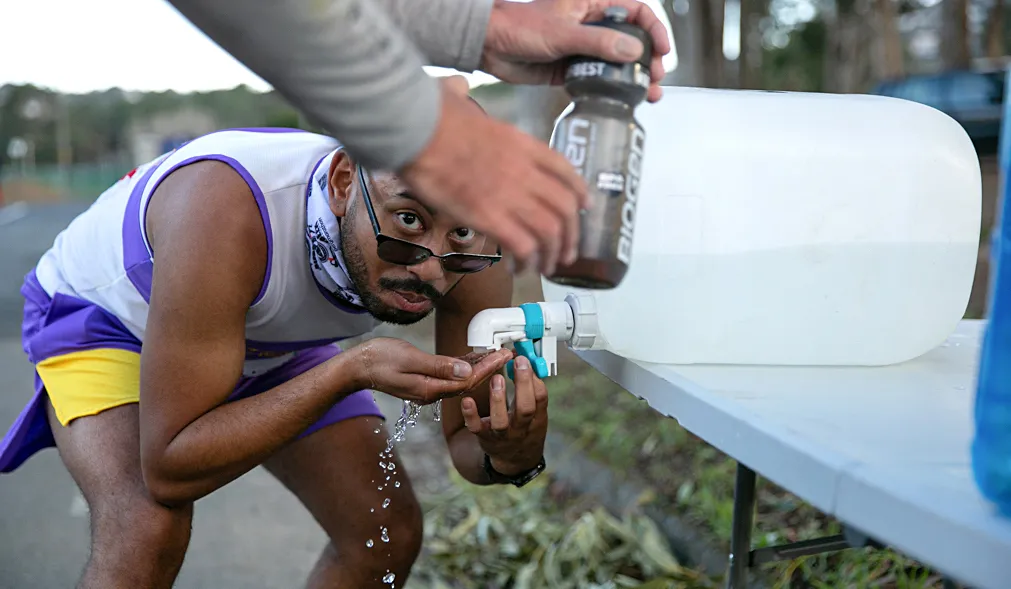
A runner at the 15km Spookhill Challenge in Somerset West, 2019, using hydration stations. (Photo: Shuyb Hendricks via ABPhotoZA)
“You have to understand that this is our first year of taking definitive steps towards becoming more green, and so everything will need to be phased in,” said Ashworth.
“Maybe in a few years, we’ll look at a few more changes. But right now this is the best we can do… I think it’s a great step in the right direction.”
Are runners ready to make a change?
“We can’t force people to run with hydration packs – it would cause such an upset,” said Ashworth.
“The majority of runners are not interested in running with hydration packs… They want the water to be available in a sachet.
“Runners pay their entry fee and expect to be provided with what they need for the duration of the race.”
Read more in Daily Maverick: Climate change shifting the goalposts for global sport
The Bay to Bay Race, which passes through environmentally sensitive areas from Camps Bay to Hout Bay, provides paper cups to its 5,000 entrants (no sachets). For the faster runners, marshals hand them drinks.
“It just shows you that it can be done,” said race organiser Ameen Stemmet.
“It’s just really to change the mindset of our running community.”

Raydon Balie, finishing in first place at the 30km Bay to Bay Road Race in 2024, carrying his own soft bottle. (Photo: Topform Athletics Club)
He added, “If the winner of the 30km can do it [carrying his own reusable bottle], then it can’t be too difficult for everyone else to do the same.
“I think a lot of runners want the best time and conditions,” reflected Oldknow, “and I do understand it. I want my best race scenario as well. But I think we’ve got to consider our impact.”
Stemmet said runners were a little resistant when organisers first made the switch from plastic sachets, but after they made sure there were enough cups of water at tables, people got accustomed to it.
Responsibility for the environment
“Anyone who has taken a run in a forest or sailed on a lake knows how closely sports are connected to nature,” said Stewart Maginnis, the International Union for the Conservation of Nature’s (IUCN) deputy director-general.
“At the same time, sports also impact nature in various ways.”
The IUCN Sports for Nature Framework aims to deliver nature-positive action across sports. Out of its 54 signatories – including big names like the International Olympic Committee, E1 Series and World Rugby – it only has one running organisation, Ultra-Trail du Mont-Blanc. The Sports for Nature is a joint initiative between the IUCN, the International Olympic Committee, UNEP, CBD Secretariat and Sails of Change.
Mostert said she had learnt a lot since she organised her first plastic-free race in 2019, the Spookhill Challenge.
“As the race organiser, I could make this decision [because I care about the environment],” she said, “but I had the support of our club, and that really helped.”
Mostert has since gone on to help the Winelands Marathon & Half-Marathon to go plastic-free by providing paper cups and taps for the 5,000 racers to fill their containers.
“I learnt so much and decided right away that while I’m involved in race organising, we will never have sachets again,” said Mostert.
“Maybe we need to find a little bit of balance [between sachets and cups],” said Oldknow, who holds the second-fastest women’s marathon time in SA.
Marvin Draai, organiser of the Festival of Running in Nelson Mandela Bay in the Eastern Cape – which is sachet-free – said: “Water sachets were a good and innovative way to cover the water requirement at the time.
“We have now been educated and seen the impacts of plastic on the environment and it is our responsibility to ensure we do our part to reduce plastic consumption and eventually move away from it completely.”
“I think we just need to talk… I don’t think we should just accept that plastic sachets are convenient,” said Stemmet.
“Convenience is not what is important,” said Mostert.
“It’s also convenient to buy an instant meal in plastic wrap and styrofoam, or buy five plastic bags when you shop – this doesn’t make it right.
“Once you’ve made the mind shift, it’s impossible to go back.” DM





















I remember reading about one marathon where the world record was broken around 1980, think it was the New York marathon and an Ethiopian, could even have been first 2h10.
Any way, the winner, stopped after 15 km, took off his shoe and shook out a stone, before tying his laces and setting off again. “Lost” 90 seconds or so. But if he had not done so he probably would not finish.
For runners not to stop and drink from a cup, if they need to is silly.
Also run in some marathons where the rule was take your own water and finish with your bottle or no medal. Most people had 250 ml, in light holsters at the start and were fine.
Good points – perhaps races should be branded as “clean” or “dirty”. Who wants to brandish a medal from a “dirty” race?
You’ve gotta love it,those epitome of health and fitness individuals who actually don’t give a rats arse about the pollution they make LET ALONE all the micro plastics they ingested over the years. Greed and self-interest take the cake
The 2023 Spookhill race was cancelled due to weather-related safety concerns. The “Spookhill” picture above must be from another race, or another year’s Spookhill.
I recall seeing a very interesting article on CNN, which got me thinking that this could be a step in the right direction. The invention is called Ooho and made from a seaweed extract. There is more to read on ooho dot com